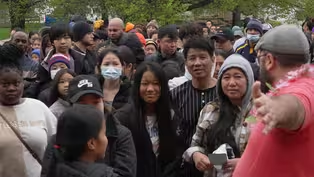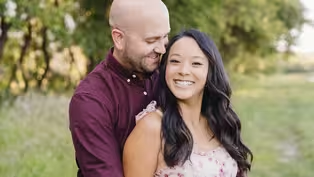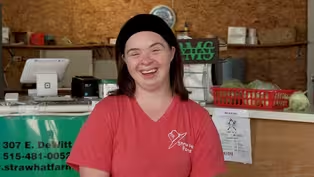
The Lyceum Movement
Clip: Season 1 Episode 106 | 4m 58sVideo has Closed Captions
The lyceum movement is a revival of an old tradition of public learning.
The lyceum movement is a revival of an old tradition of public learning. It creates a space where Iowans can meet face to face and have meaningful conversations.
Problems playing video? | Closed Captioning Feedback
Problems playing video? | Closed Captioning Feedback
Iowa Life is a local public television program presented by Iowa PBS

The Lyceum Movement
Clip: Season 1 Episode 106 | 4m 58sVideo has Closed Captions
The lyceum movement is a revival of an old tradition of public learning. It creates a space where Iowans can meet face to face and have meaningful conversations.
Problems playing video? | Closed Captioning Feedback
How to Watch Iowa Life
Iowa Life is available to stream on pbs.org and the free PBS App, available on iPhone, Apple TV, Android TV, Android smartphones, Amazon Fire TV, Amazon Fire Tablet, Roku, Samsung Smart TV, and Vizio.
Providing Support for PBS.org
Learn Moreabout PBS online sponsorshipWe've seen such a decline in community life.
People belong to fewer clubs.
They know fewer of their neighbors names.
They trust each other less.
We have fewer friends than we've ever had in the past.
And so right now is a time where we need to be purposeful about being in community with the people we live with, we can have public conversations that aren't always fights.
And we don't need to just talk at election time.
There are lots of things to talk about, lots of things that we care about.
I see them as a revival of an old tradition of public learning in the United States.
In Des Moines, its history goes back to the founding of our city.
Actually, before the founding of our city in the early 1850s.
And as soon as people moved here to Des Moines, one of the most important things on their minds, one of the first things they built was a Lyceum, which was a place where the community could come and think together.
It was founded by a farmer and with the intent of reaching mechanics, of working people of all kinds.
The idea is that these kinds of big ideas don't just belong in big coastal cities or important places or in universities, but are things that actually lots of people think about in the quiet moments of their lives.
These questions about how to live well, how to govern our community well, welcome to the Lyceum movement for this afternoon on this beautiful Saturday.
I'd like to get started now.
Ill introduce our panelists.
We don't do.
The hot topics of the day where people already have sorted themselves in to boxes and already have their pre-made opinions.
We try to go deeper into the philosophical issues.
So today we're talking about artificial intelligence and something that's in the public air but we're going to try to talk about it in a deeper and more thoughtful way.
One of my worries is not so much that robots are going to replace us, but that that we are becoming increasingly indistinguishable from robots.
So at the Lyceum, we don't just hear from our wise sages on the stage, but we're going to get into small groups now.
And if you came with somebody, I encourage you to mix it up and try to go out a group with somebody you didn't come with.
That's what the shape of our typical kind of event is, is you get this expertise and this new knowledge, and then you get to really know your neighbor, understand where your neighbor is coming from, and together work towards some kind of progress on the questions that we're considering.
Now, obviously, it's not intelligent necessarily, but it's smart enough.
Because that would be a guardrail that I would love to see.
And that's what we've been doing to date, and that makes no sense.
So, yeah, we try to read the words of what somebody else is saying, the best way to use them and give it as generous and understanding as we can.
We try to look for something to love and whoever we're talking to, even if they disagree, we try to talk for the sake of truth and understanding, not for winning or for victory.
And then at the end of each of our events, we end with a toast and a commission.
Our toast, what came up a lot in our conversation was that we really do resonate with each other.
So to those nice understandings, those deeper, more qualitative aspects that come up in our human interactions that are really valuable to us.
And that's what we wanted to test for.
Our mission is that we want to build the context of hope so that when we encounter AI the context of hope and not a context of fear, the things that come out of it a lot of times tend towards a commitment to being more neighborly.
We've had multiple people who came and spoke here and they said, you know, this is so Iowa what this is says, something about the energy of it and the culture we had coach Kirk Ferentz here last night.
We talked about sports, you talked about food.
It could be all kinds of topics.
And it's been really nice to see that people have seen their lives, something missing.
And so to get around that toxicity of the online fights and instead we can engage with each other and disagree.
And so, yeah, thanks for coming, everybody.
Video has Closed Captions
Clip: S1 Ep106 | 6m 24s | Many refugees struggle managing their trauma while retaining vital parts of their culture. (6m 24s)
Video has Closed Captions
Clip: S1 Ep106 | 6m 17s | Meet a young couple whose love story is one for the history books. (6m 17s)
Video has Closed Captions
Clip: S1 Ep106 | 6m 5s | Marissa Schletzbaum, who has Down Syndrome, is a Special Olympian from Pleasantville, Iowa. (6m 5s)
Providing Support for PBS.org
Learn Moreabout PBS online sponsorshipSupport for PBS provided by:
Iowa Life is a local public television program presented by Iowa PBS
















